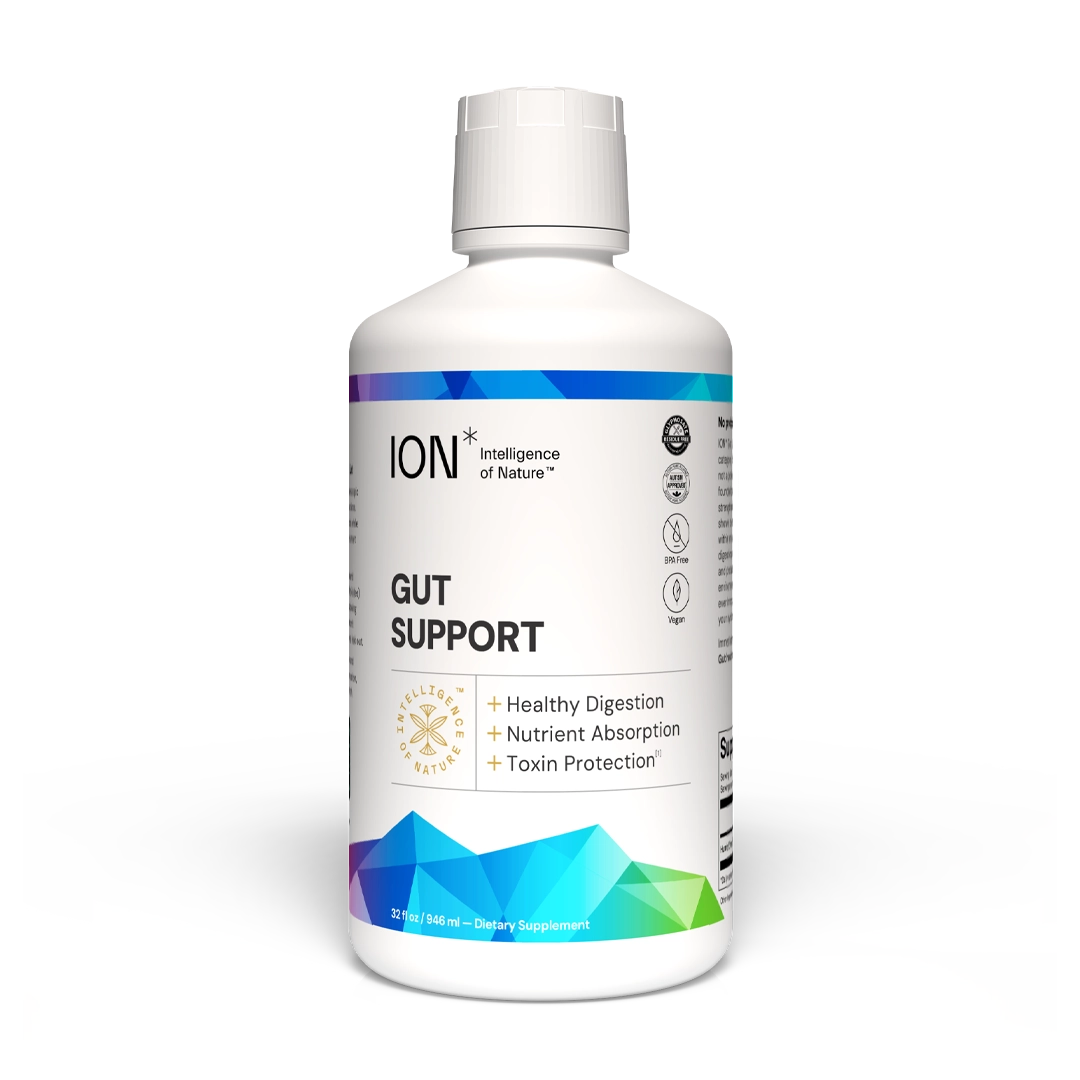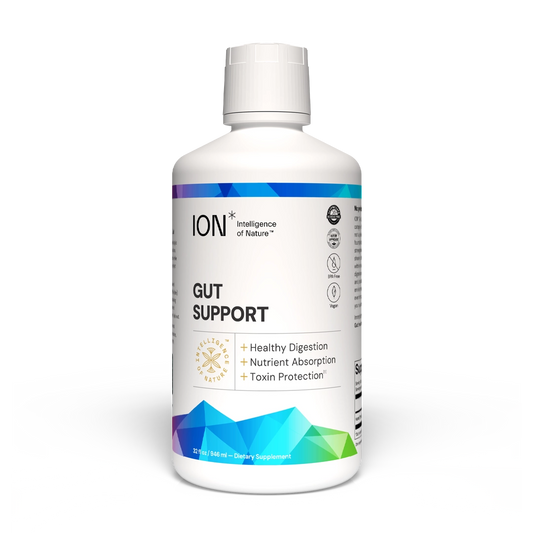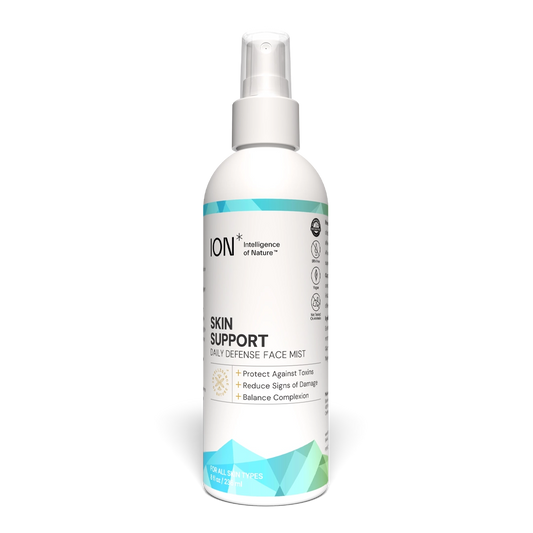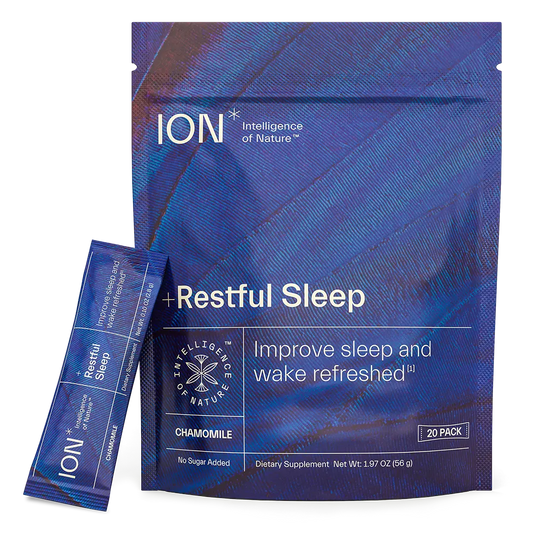No doubt, gut health has been a trending topic in the world of self-optimization. If you've been on TikTok or Instagram in the past year, then you’ve probably seen at least one video promoting a probiotic, coffee alternative, or supplement designed for gut restoration.
The symptoms of gut issues are omnipresent. Chronic constipation, diarrhea, unexplained abdominal discomfort, and a general “blah” feeling are all common signs of poor gut health.
Not only are gut problems associated with classic bloating, gas, and cramping symptoms, but our overall digestive health is linked to the immune system and heart health; and recent research on the gut-brain axis now shows a mental, emotional, and neurological connection as well.
While gut health continues to be a mainstream topic, the condition known as leaky gut has become a popular point of emphasis. Social media influencers like to pedal their go-to poison pill plans, ranging from aloe vera juice to olive oil. But unfortunately, no quick-fix biohack is going to restore problematic gut leakage.
What is Leaky Gut Syndrome and How Serious Is It?
Colloquially named, leaky gut syndrome is a condition that's characterized by increased intestinal permeability or intestinal hyperpermeability. It's the result of the gut’s lining becoming damaged, allowing undigested food particles, toxins, and bacteria to pass through the gut's walls into the bloodstream.
This weakened integrity of the intestinal lining can lead to an array of systemic health issues, many of which are uncomfortable to deal with, and in some cases, hazardous to one’s health.
Leaky gut syndrome may be responsible for a host of health conditions, ranging from minor food sensitivities, fatigue, and stomach pain to more concerning issues like autoimmune conditions, diabetes, depression and mood disorders, inflammatory bowel disease, and multiple sclerosis.[1]
To truly grasp what’s attributing to a leaky guy, there’s more to unpack than just a damaged intestinal lining. One key factor contributing to this syndrome is the weakening of tight junctions – proteins that hold together cells in your intestinal lining.[2]
Tight Junctions – What's Your Function?
Tight junctions play a vital role in maintaining a healthy barrier between your intestines and your bloodstream. Think of them as gatekeepers that selectively allow certain substances such as water-soluble nutrients while preventing harmful substances like pathogens or large molecules from passing through.[3]
When these tight junctions become compromised – due to either a poor diet or exposure to environmental toxins like pesticides or herbicides (particularly glyphosate) – they lose their ability to effectively control what enters your bloodstream, resulting in a leaky gut.
The Impact of Glyphosate on Leaky Gut
Glyphosate, a widely used herbicide found in products like Roundup, has been linked to the development of leaky gut. This chemical disrupts tight junctions by interfering with their structure and function.[4]
As glyphosate exposure becomes more and more common due to its widespread use in agriculture, it's increasingly important to stay vigilant about glyphosate in food. Despite the EPA's dismissal of any human health concerns and a general failure of regulatory assessment, glyphosate remains a toxic and prevalent ingredient in corn, soy, and other common crops.
Leaky gut is not a condition that can be fixed overnight, and it's one that shouldn't be taken lightly. It's critical to be aware of the potential signs of a leaky gut in order to take steps toward treating it.
What are the Signs and Symptoms of Leaky Gut?
To put it bluntly, a leaky gut can be an unpleasant experience. The condition comes with a range of signs and symptoms, making it feel like a puzzling labyrinth to figure out. Some common symptoms associated with leaky gut include.
- Gastrointestinal issues: Individuals suffering from leaky gut may experience bloating, gas, diarrhea, constipation, or irritable bowel syndrome (IBS).
- Nutrient deficiencies: As mentioned earlier, a compromised intestinal barrier makes it difficult for your body to absorb essential nutrients properly. This can lead to nutritional deficiencies in vitamins and minerals such as iron and vitamin B12.
- Mood disorders: Research has shown that there is a strong connection between the gut and the brain. In turn, imbalances within the gastrointestinal system could contribute to mood swings, anxiety, or depression.[5]
- Skin problems: Skin conditions like acne, eczema, or psoriasis have been linked with poor gut health due to increased inflammation caused by a permeable intestinal lining.[6]
- Fatigue & low energy levels: Leaky gut can lead to poor nutrient absorption, which, in turn, may result in chronic fatigue and low energy levels.[1]
- Autoimmune diseases: A leaky gut has been associated with an increased risk of developing autoimmune conditions such as rheumatoid arthritis, lupus, or celiac disease.[7]
- Food sensitivities & allergies: Increased intestinal permeability allows undigested food particles to enter the bloodstream, triggering immune responses that could cause food sensitivities or allergies.[8]
- Inflammation & joint pain: Leaky gut syndrome can contribute to systemic inflammation throughout the body, leading to joint pain, arthritis, and other discomforts.
Leaky gut syndrome can manifest in various ways, with symptoms ranging from mild to severe. It’s essential to be mindful of these indicators so that you can act swiftly in order to treat gut issues before they escalate.
Is There a Test for Leaky Gut?
Diagnosing leaky gut can be perplexing since its symptoms overlap with many other health conditions. Unfortunately, there is no single definitive test available. However, there are a handful of tests that can be helpful in identifying if you have increased intestinal permeability:
- Lactulose-mannitol test: This non-invasive urine test measures the levels of two sugars (lactulose and mannitol) that are ingested by the patient. If high levels of these sugars are found in the urine, it may indicate increased intestinal permeability.[9]
- Zonulin test: Zonulin is a protein that regulates tight junctions between cells in the gut lining. Elevated zonulin levels can be indicative of leaky gut syndrome.[10]
- Intestinal biopsy: In some cases, doctors might recommend an intestinal biopsy to examine tissue samples from your small intestine for signs of damage or inflammation. This invasive procedure should only be considered if other tests fail to provide conclusive results.
As with most health issues that devastatingly impact our physical and mental well-being, it's important to consult with your healthcare provider if you suspect you have leaky gut syndrome. They can help determine whether further testing is necessary and guide you through appropriate treatment options based on your specific symptoms and medical history.
How Leaky Gut Syndrome Affects Overall Health
Leaky gut syndrome can take a significant toll on your overall health, as it has been linked to various chronic diseases and conditions. When the intestinal barrier becomes compromised, substances that should not pass through the gut lining are allowed into the bloodstream, thereby causing inflammation and potentially triggering an immune response.
Chronic Inflammation
Inflammation is a natural defense mechanism of our body against harmful stimuli such as pathogens or toxins. However, when this process goes awry due to leaky gut syndrome, it can lead to chronic inflammation, which is associated with numerous health issues including autoimmune disorders, heart disease, diabetes, and even cancer.[11]
Autoimmune Disorders
Autoimmune problems can be a worst-case scenario when it comes to a leaky gut. These issues can trigger immune system conditions like:
- Rheumatoid Arthritis: Research suggests that increased intestinal permeability may contribute to the development of rheumatoid arthritis by allowing bacteria or their components into systemic circulation.[11]
- Celiac Disease: Celiac disease is an autoimmune disorder triggered by gluten ingestion in genetically susceptible individuals. Studies show that people with celiac disease often exhibit signs of leaky gut.[12]
- Type 1 Diabetes: There is evidence suggesting a link between type 1 diabetes and increased intestinal permeability.[13]
Nutrient Malabsorption
A healthy gut is essential for proper nutrient absorption, but when the intestinal lining becomes compromised due to leaky gut syndrome, it can be difficult for your body to absorb vital nutrients from food. This can lead to nutritional deficiencies, which may manifest as fatigue, weakened immune system, or even hair loss.
In addition to these health issues, leaky gut syndrome has also been linked with mental health disorders such as depression and anxiety.[14] Consequently, taking action to treat this condition is essential for not just preserving a functioning digestive system but also for enhancing one’s quality of life.
Causes of Leaky Gut
Let it be known that we all have some degree of leaky gut. The barrier that makes up the intestinal lining is not entirely impenetrable, and it isn't supposed to be. Some people have a genetic predisposition and may be more susceptible to such digestive issues. But DNA is not the only cause to blame.
Lifestyle may actually be the biggest underlying factor behind gut inflammation, particularly the foods we consume. Mounting evidence suggests that the standard American diet – which is notoriously low in fiber, high in sugar, and rich in saturated fats – may trigger gut barrier degradation.
Dietary Factors
One of the primary causes of increased intestinal permeability is having a low biodiversity of gut bacteria. [15] For most individuals, this is largely attributed to consuming a poor diet that's high in sugar, processed foods, and low in dietary fiber.
In other words, a lack of whole, fibrous, gut-healthy foods – and instead a diet that's dense in frozen meals, fast food, packaged snacks, canned goods, deli meats, and sugary beverages – can exacerbate leaky gut symptoms.
High FODMAP foods can also be a culprit. FODMAPs are short-chain carbohydrates that are difficult to digest. And unfortunately, a lot of them are considered healthy, like legumes, pears, goji berries, dates, asparagus, onions, barley, and rye, to name a few. For those with gut sensitivities, particularly leaky gut, a low FODMAP diet is generally advised.[16]
Stress & Lifestyle
It's no longer a debate that our mental health can have a direct impact on our physical well-being, and the link between stress and gut health is a testament to this powerful connection. As for leaky guy syndrome, studies show that chronic stress has been directly linked to increased intestinal permeability.[17]
Resorting to unhealthy stress-reduction habits can compound these issues. You guessed it: alcohol. While a stiff cocktail after a stressful day might sound like an appetizing stress reliever, excessive alcohol consumption can wreak havoc on the gut's lining by increasing inflammation and oxidative stress within the intestines.[18]
Exposure to Toxins & Pesticides
Coinciding with the food we eat, prolonged exposure to environmental toxins such as heavy metals or chemicals can take a costly toll on your gastrointestinal system. What's unfortunate is that many of these chemicals are found in countless store-bought foods we eat, and most consumers are unbeknownst that they’re eating it.
As mentioned above, glyphosate – an active ingredient in countless agricultural herbicides – has been identified as a potential initiator of leaky gut syndrome due to its ability to impair tight junctions within the intestinal lining. Beyond that, this Monsanto product is a widely known endocrine disruptor, which means it interferes with the production and functioning of hormones.[19]
Glyphosate hides in a wide variety of processed foods made from corn (including corn syrup), soy, and wheat, which are the base ingredient of countless breakfast cereals, crackers, and snack foods. It’s not just a contributing factor to leaky gut syndrome, but it's a hidden epidemic that's plaguing the global food supply.
Medications & Antibiotics
It's no secret that antibiotics, while crucial in killing off bacterial infections, also destroy good bacteria that make up a healthy gut microbiome. Overuse or misuse of antibiotics can severely disrupt this bacterial balance, which has been shown to contribute to a weakened intestinal lining.[20]
Additionally, certain medications such as non-steroidal anti-inflammatory drugs (NSAIDs) have been associated with an increased risk of developing a leaky gut.
How to Repair a Leaky Gut
Despite all the mushroom "coffees" and gut health remedies claiming an overnight cure for leaky gut, the fact of the matter is, there's no quick fix. The good news is that the process of fixing a leaky gut is doable over time with the right everyday lifestyle choices.
Clean Up Your Diet
The first and most important step to repairing a leaky gut is to remove gut-inflammatory foods from your diet. That means cutting out processed grub, refined sugars, and artificial components that can irritate the gut's lining. Instead, focus on consuming whole, plant-based foods that are rich in nutrients and fiber.
This means consuming more (ideally organic) foods like
- Fruits: pineapples, grapes, bananas, oranges, papaya
- Vegetables: broccoli, beets, carrots, spinach, squash
- Healthy Fats: avocado, coconut oil, and Omega-3's found in flaxseed, chia seeds, walnuts
- Gluten-Free Grains: brown rice, buckwheat, millet, gluten-free oats
- Sprouted Seeds: chia, hemp, flax, sunflower
- Raw Nuts: peanuts, almonds, walnuts
- Cultured Dairy: kefir, Greek yogurt, buttermilk
- Fermented Foods: sauerkraut, kimchi, kombucha
And limiting or avoiding:
- Gluten-containing foods like wheat-based cereals, breads, baked goods, and pasta
- Processed cookies, crackers, and snack foods
- Red meat and processed deli meat, including cold cuts
- Added sugars and artificial sweeteners
- Non-cultured dairy
- Refined oils
- Alcohol
- Conventional fast food
- High FODMAP foods
Implement Stress Reduction Lifestyle Modification
We know that stress can provoke symptoms of a leaky gut. Yet it still might sound woo-woo that stress reduction can help support gut health. If that's a difficult truth to grasp, just keep in mind all the other health benefits of reduced stress, like stronger immunity, better sleep, and lifted mood, to name a few.
Leaky gut or not, prioritizing stress reduction in your daily routine is crucial in today's fast-paced world. Implementing stress reduction lifestyle modifications like getting regular exercise, meditation, mindfulness, restorative yoga, and quality sleep can all support gut health.
Strengthen Tight Junctions
In simple terms, healing intestinal permeability is all about closing enlarged gaps, or improving the function of tight junctions. This is ultimately the root cause of unwanted bacteria, food particles, and waste products getting through the gut's lining and seeping directly into the bloodstream.
Yes, diet and nutrition are key to playing the long game in restoring tight junctions. But there are other science-supported solutions that can accelerate this process. More than just any probiotic, ION* Gut Support is a soil-derived wellness solution that works with your body's natural healing processes to reinforce tight junctions in your gut lining.
In fact, testing has shown ION* Gut Support effectively closes the gap in tight junctions in the gut, even when they’ve been damaged due to prolonged chemical exposure or a high-glyphosate diet. While it's not an instant fix, it is a powerful aid that can restore gut health and strengthen your body's critical functions.
FAQs about Leaky Gut Syndrome
Given the vast spectrum of causes and symptoms associated with leaky gut syndrome, the condition comes with a lot of questions. Here are some of the most common.
Can Leaky Gut be Cured?
While there are no definitive, curable treatments specifically for leaky gut syndrome, it is possible to improve the condition by treating the underlying variables causing it. Certain anti-inflammatory treatments for gastrointestinal diseases like Crohn's or ulcerative colitis are shown mildly effective.[1]
However, consistent lifestyle changes like consuming a balanced diet rich in plants and fibrous food, managing and reducing stress, and avoiding certain medications are some of the most potent steps in improving gut lining integrity. Additionally, certain gut health products can help revive tight junctions of the intestinal lining. And treating nutrient deficiencies, particularly vitamin D, can also help repair a leaky gut.
Is Leaky Gut a Recognized Medical Condition?
The term "leaky gut" is not a recognized medical diagnosis nor universally accepted within the medical community; however, many healthcare professionals acknowledge its existence as part of a broader category known as increased intestinal permeability. Although it's not medically recognized, this condition has been linked to numerous chronic diseases in scientific studies.
Are There Specific Foods to Avoid with Leaky Gut?
Certain foods can either improve or worsen intestinal permeability. Of primary types of foods to avoid with leaky gut include:
- Sugar and artificial sweeteners: Excessive consumption of sugar and certain artificial sweeteners like sucralose can lead to gut inflammation and disrupt the balance of good bacteria in your microbiome.
- Dairy products: Non-fermented dairy foods like milk and cheese are some of the worst culprits in causing and worsening leaky gut.
- Gluten: This structural component of wheat is found everywhere and has been shown to induce gut inflammation, particularly in people with gluten sensitivity or intolerance.
- Glyphosate-contaminated foods: Glyphosate exposure has been shown to contribute significantly toward developing leaky gut. Check out this related post on the top glyphosate foods to avoid.
Can leaky gut cause weight gain or loss?
Depending on the individual's unique circumstances, yes, leaky gut can contribute to both weight gain and loss. Inflammation caused by leaky gut may lead to weight gain due to increased insulin resistance and fat storage. On the other hand, malabsorption of nutrients resulting from a compromised intestinal barrier could cause unintended weight loss.
Leaky gut syndrome is not your typical bowel irritation. It’s a significant disorder that can be life-altering. The best course of treatment is addressing the source, which is largely centralized on compromised tight junctions. While there’s no hard-and-fast curable treatment, the right approach to diet, nutrition, and stress mitigation can pay dividends in restoring leaky gut issues.
Scientific References
- https://www.ncbi.nlm.nih.gov/pmc/articles/PMC6790068/
- https://www.ncbi.nlm.nih.gov/pmc/articles/PMC4253991/
- https://www.frontiersin.org/articles/10.3389/fphys.2018.00707/full
- https://cdn.shopify.com/s/files/1/0354/2789/files/Glyphosate_article.pdf
- https://www.ncbi.nlm.nih.gov/pmc/articles/PMC5641835/
- https://www.ncbi.nlm.nih.gov/pmc/articles/PMC7916842/
- https://www.ncbi.nlm.nih.gov/pmc/articles/PMC5440529/
- https://www.ncbi.nlm.nih.gov/pmc/articles/PMC4377866/
- https://www.ncbi.nlm.nih.gov/pmc/articles/PMC6687120/
- https://www.ncbi.nlm.nih.gov/pmc/articles/PMC3384703/
- https://www.ncbi.nlm.nih.gov/pmc/articles/PMC4246018/
- https://www.ncbi.nlm.nih.gov/pmc/articles/PMC3705319/
- https://pubmed.ncbi.nlm.nih.gov/14971814/
- https://www.ncbi.nlm.nih.gov/pmc/articles/PMC4604320/
- https://www.ncbi.nlm.nih.gov/pmc/articles/PMC6143810/
- https://www.ncbi.nlm.nih.gov/pmc/articles/PMC6062106/
- https://www.ncbi.nlm.nih.gov/pmc/articles/PMC7213601/
- https://www.ncbi.nlm.nih.gov/pmc/articles/PMC5513683/
- https://www.ncbi.nlm.nih.gov/pmc/articles/PMC8622992/
- https://www.ncbi.nlm.nih.gov/pmc/articles/PMC9959899/












